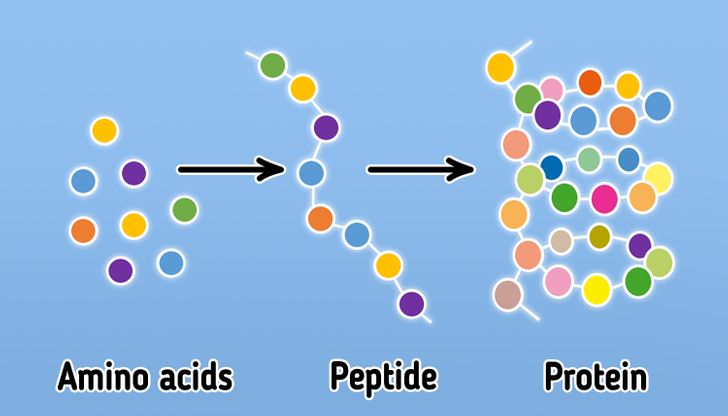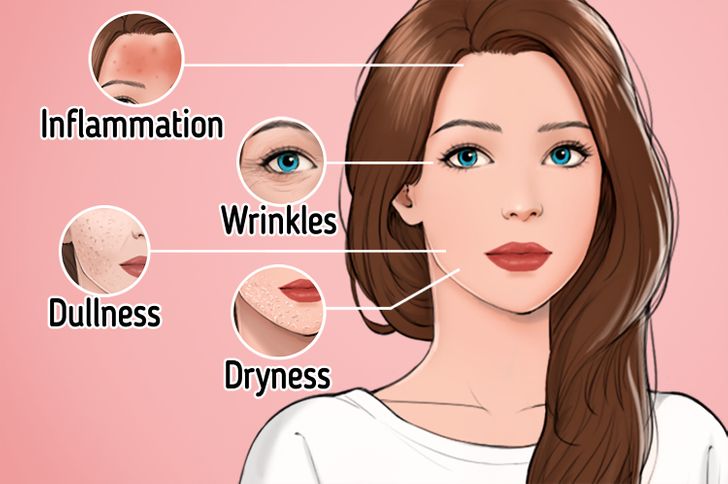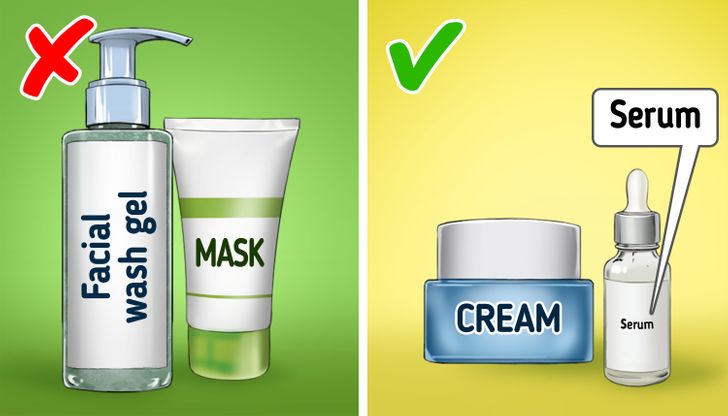What Peptides Are, and Why They Are Used in Skincare Products
There are often mysterious “peptides” mentioned among the ingredients of anti-aging skincare products. It is believed that they fight wrinkles and other signs of aging and restore the elasticity of the skin. But are all peptides the same, and what result can be expected from their use?
5-Minute Crafts would like to tell you about what peptides are, how they work, how effective they are, and how to use them correctly in your skincare routine.
What peptides are

Peptides are short chains of 2 or more amino acid residues that are linked by peptide bonds. They come in different lengths, but if the chain contains more than 50 amino acids, this peptide is called a protein.
Collagen, a protein made up of long segments of amino acids, provides a foundation and thickness for our skin. Over time, collagen breaks down, leading to the thinning of the skin and the appearance of wrinkles. In the process of breaking down, shorter segments of amino acids are formed — called peptides. They send a signal to the skin that it has lost collagen and has to start producing it again.
When these peptides are applied in the form of a cream or serum, the skin perceives them as the product of collagen breakdown, which means that the body needs to produce new protein. This helps the cells produce more collagen, which in turn reduces wrinkles and improves skin firmness. However, the effect of peptides is not limited to just this.
How peptides work
There are 4 types of peptides used in skincare products:
- Peptides that trigger the signaling cascade are peptides that signal the skin to produce more collagen. As a result, the skin becomes fresher and firmer. These peptides include carnosine, palmitoyl tripeptide-1 (pal-GHK), palmitoyl pentapeptide-4 under the brand name Matrixyl, and many other peptides.
- Carrier peptides deliver various trace elements to the skin. They also stimulate collagen production as well as heal the skin and repair it from damage. Carrier peptides include copper tripeptide and manganese tripeptide-1.
- Neurotransmitter inhibitor peptides act like botulinum toxin. They relax the muscles of the face, which makes existing wrinkles diminish and new ones form more slowly. Examples of these peptides are pentapeptide-3, pentapeptide-18, tripeptide-3, and acetylhexapeptide-3 under the brand name Argireline.
- Enzyme inhibitor peptides inhibit the action of enzymes that break down collagen and thereby prolong the life of the protein. These peptides include soybean peptides, rice peptides, and silk fibroin peptides.
The benefits of peptides

Peptides are believed to have the following effects on the skin:
- They reduce wrinkles. By increasing the production of collagen, peptides smooth the skin, increase its elasticity, and give the face a more youthful look.
- They improve the complexion and skin texture. Peptides smooth the surface of the skin, fight against dullness, and provide the face with a healthy complexion and radiance.
- They relieve inflammation and regenerate the skin. Peptides soothe the skin, contribute to healing processes, reduce inflammation, and strengthen the protective barrier.
- They help retain moisture. By increasing collagen production, peptides also increase the level of water in cells. This helps fight dehydration and dryness.
The disadvantages of peptides
The main disadvantage of peptides is the lack of reliable information proving that they actually work. Most of the conducted studies don’t provide a clear answer as to whether peptides are effective against skin aging. There are 2 main doubts:
- There were too few participants in the conducted studies. Their number is not enough to draw precise conclusions about how effective peptides are.
- Some studies have used products that contain not only peptides but also other active substances. For example, niacinamide, vitamin C, and moisturizers. It’s difficult to say for sure what exactly produced the effect: the peptides being studied or the other substances that the test product contained.
For these reasons, it’s not yet clear whether peptides are effective or not. Scientists only assume that they work, and continue to conduct further research.
Besides, products containing peptides can cause irritation, like any other skincare product. Before applying, be sure to test them on a small area of your skin.
How to use skincare products containing peptides

Peptides are added to cleansers, masks, serums, and moisturizers. It’s recommended to choose a product that stays on the skin longer and has enough time to take effect, like serums and creams. You should avoid products that you have to wash off your skin immediately, like masks and cleansers.
Skincare products with peptides should be used according to the instructions on the package. Peptides are quite safe for daily use, but it’s best to stick to the frequency of use that the manufacturer recommends.
Besides, it’s advisable to consult a dermatologist before using any of these skincare products. They will help you choose the best care for your current skin condition and your needs.